News & Views
Reflections: The Transforming Power of Bread
Kawther Luay contemplates the resurgence of bread-making during the Covid-19 lockdown, and offers two nourishing poems
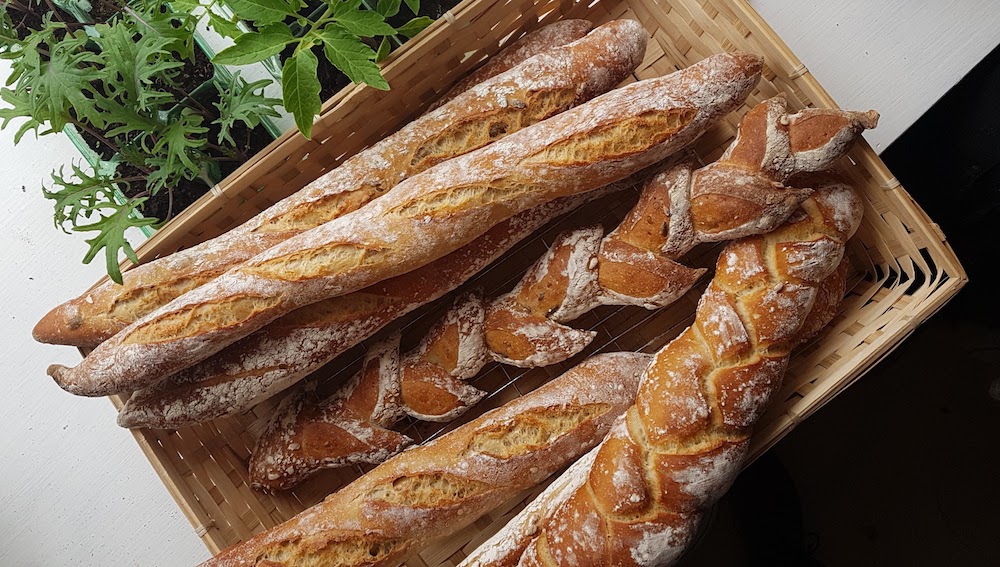
Baguettes and seedlings at the Heritage Bakehouse Honesty Shop, Huntly, Scotland. Photograph: Kawther Luay
DESPITE there being no shortage of bread on supermarket shelves, one of the unexpected effects of the Covid-19 lockdown in the UK was the lack of flour and yeast as the population took up bread-making en masse. This remarkable surge of interest perhaps reflected a societal need to take back some semblance of control, to slow down, and to reconnect to essential aspects of living. Baking bread offers us the opportunity to get stuck into a challenge, to see how we get on, to fail and try again the next day to make something better. It gives us continuity and structure, gradually gaining patience, experiential knowledge and skill.
When we do manage to arrive at a delicious loaf of bread made from our very own hands, it becomes a marker of dignified empowerment. The practice of making bread, we find, is not just about following a recipe, but about engaging in an ancient alchemical process using the aid of our senses. Raw dough becomes something we can read and respond to with direct tactility; rather than manipulating the ‘perfect’ conditions for bread to rise and ferment, we simply learn to discern when a sourdough starter or leavened dough needs more time. Andrew Whitley, author of Bread Matters [1] and founder of Scotland the Bread [/], said in his 2015 talk titled ‘The Transformative Power of Sourdough Bread’: [/]:
Baking your own bread is a small act of self-reliance with revolutionary potential. For many it is the first step on a journey to take control of how we nourish ourselves. [2]
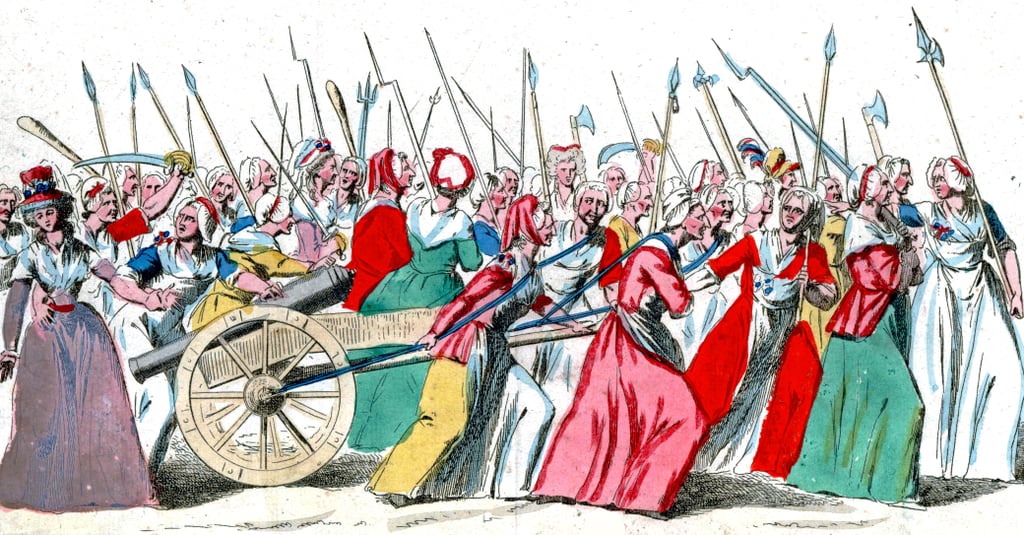
Contemporary depiction of the Women’s March on Versailles in 1789
Don’t Meddle with Bread
.
The shortages during the Covid-19 pandemic have shed light on the fragility of a food system that struggles to keep up with people’s simple wants. While the UK is nowhere near a food crisis, we need not look too far for precedents which demonstrate how little it takes to push systematically inadequate economic and environmental systems over the edge. Bread, the sacred emblem of sustenance and a barometer of societal health, for centuries, has toppled governments and monarchies that tampered too far with its fair, honest provision. For example in 1789, the Women’s March on Versailles [/] was one of the earliest events of the French Revolution, which began among the marketplaces of Paris over the scarcity of bread. Again, in 1863, the Southern Bread Riots [/] occurring throughout the American Civil War were triggered by soaring food inflation. Severe shortages overwhelmed the food supply system, where citizens, mostly women, took to violently looting shops and warehouses.
In our time, we have the example of Egypt, where bread and its provision is central to the region’s politics. Its population has the highest consumption rate of bread in the world, and consequently, is the largest importer of wheat. Everywhere else in the Arabic speaking world, bread is called by the classical noun khubz, whereas the Egyptian dialect refers to bread as ʿaish meaning ‘life’ or ‘survival’. Since the second world war, basic provisions, including bread, have been heavily subsidised to maintain social order and promote a socialist model. When the government attempted to end subsidies in 1977, Egyptians exploded in angry riots, so that to this day, Egypt pours more money into bread provision than it does on education or healthcare. The steady rise in global prices for maize, rice and wheat leading up to 2009 served as a backdrop and major driver of the Arab Spring, whose rallying cry in Tahrir Square was “Bread, freedom and social justice”.
Revolts and revolutions of such scale are of course caused by a multitude of grievances far more complicated than the price of bread, but desperate shortages of life’s basic provisions seem to be the final nail in the coffin that ignites fervent motivation among societies to rise up and demand change. In the politically astute words of Turgot, an early economic adviser to the last king of France, Louis XVI: “Ne vous mêlez pas du pain” (Do not meddle with bread).
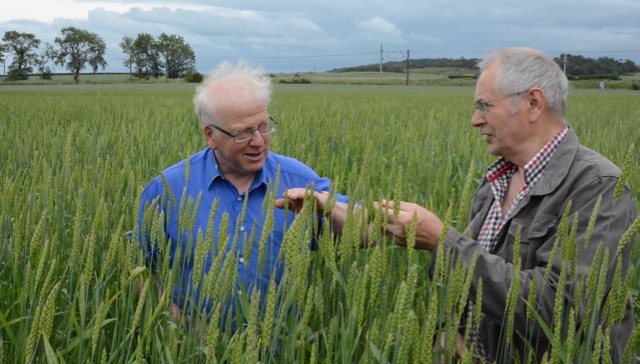
Angus McDowall and Andrew Whitley surveying Rouge d’Ecosse wheat at Mungoswells in 2015 Photograph: Marianne Landzettel
Nourishment for the Nation
In Scotland’s East Lothian, a small scale local producer of flour, Mungoswells Malt and Milling [/], has responded to the scarcity of flour by milling an ‘85% extraction’ brown flour, dubbed a ‘national flour for national emergency’. The name is taken as a token from the National Loaf – a rationed wholewheat nutrient-dense bread produced in Britain throughout the second world war, when white flour was banned and deemed an extravagant waste of precious grain. Instead of separating white and wholemeal, Mungoswells’ one grade of brown flour not only speeds up production, allowing them to keep up with a large backlog of orders, but retains its nutritious bran and wheatgerm. In our commodified food culture, these two vital elements in bread are typically removed and sold off for animal feed and for the extraction of vitamin E by the pharmaceutical industry, only to be fortified with it again using synthetic additives.
Mungoswells owner Angus McDowell had already established himself as the first, and only farmer to grow heritage grain varieties on a commercial scale, founded on a research project spearheaded by Scotland the Bread’s Andrew Whitley. In 2013, the most commonplace varieties of wheat in Scotland in the 19th century – Rouge d’Ecosse, Golden Drop and Hunter’s – were sourced from gene banks around the world, and first germinated and planted for their health benefits and suitability for long term agro-ecological farming. The grains has since been resown and transferred to the Balcaskie Estate in Fife, who are now milling a ‘modern landrace’ entitled ‘Balcaskie Landrace’, formed from the three varieties grown together, signifying a commitment to local adaptation and diversity.
“It’s not a museum project,” Whitley says, assuring us that this experiment has not been born out of nostalgic curiosity, but as a forward-thinking solution that aims to reverse the decline of nutrient-dense grain, and reduce our existing reliance on imported wheat. The ongoing scientific programme called ‘Soil to Slice’ [/] closely examines which grains are best adapted to grow in Scottish climates whilst also providing both a stable, reliable yield for farmers, and a nourishing end result for the consumer. As Whitley explains further:
What we’re trying to do is to swing the whole thrust of research round so that everybody in the system is turning themselves not from creating marginal economic advantage for individual sectors (farmers, millers, bakers and so on) which involves a loss of value, but to get everybody aligned to serve and maximise value through the system. And by value, I don’t just mean economic value for individual businesses… I mean real value for the end consumer. And the value is in the wonderful loaf of bread that we know is going to be super tasty, super digestible and full of all the nutrients we need, in a small number of slices, so we don’t get programmed into overconsumption as we are with our hollowed out vacuous breads which you seem to be able to eat an awful lot of, without it really satisfying the body in any meaningful way. [2]
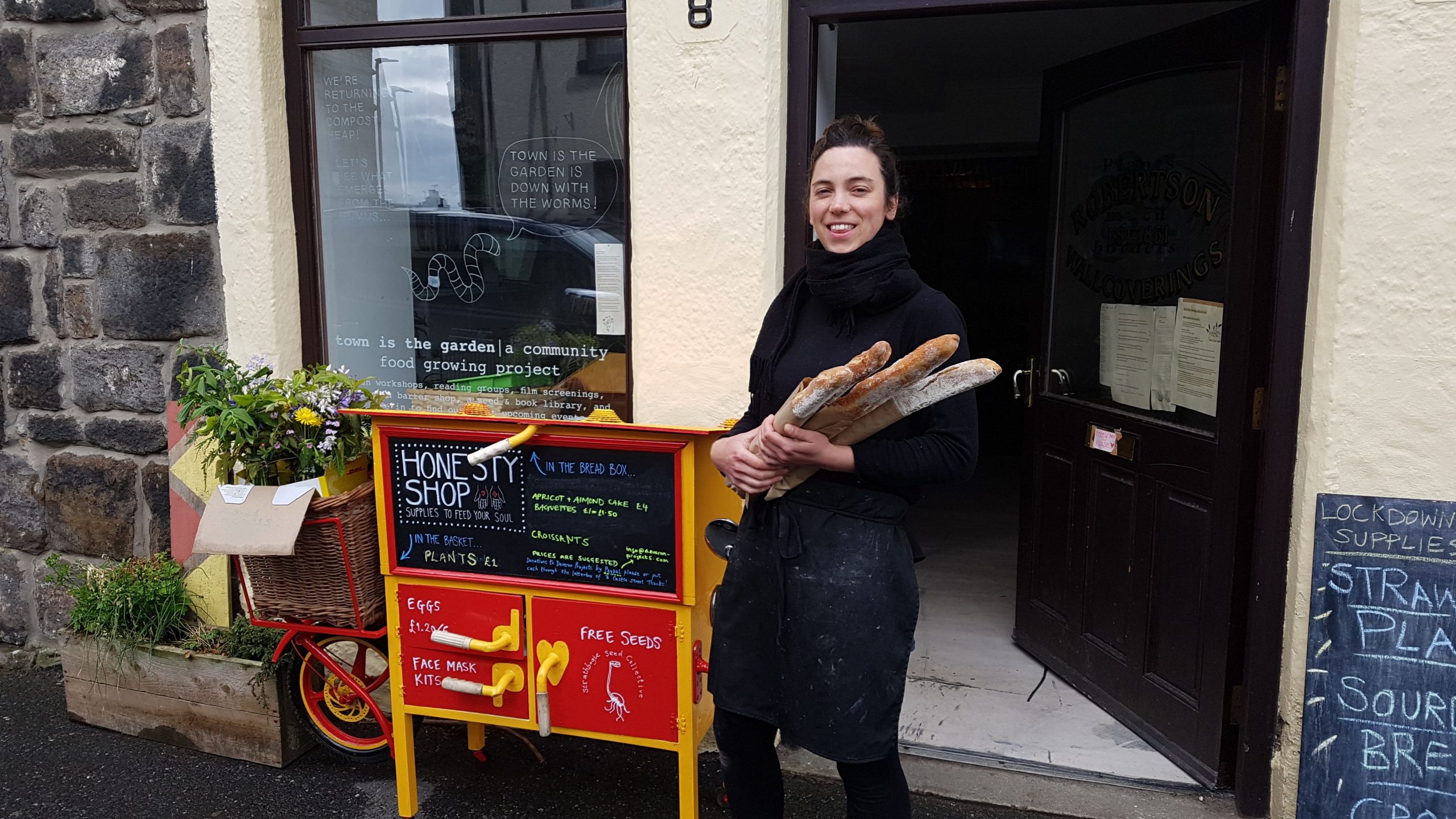
Kate Taylor Beale stocks up the Heritage Bakery Honesty Shop with baguettes. Photograph: Kawther Luay
Sourdough & Poetry
Another lockdown project has been run by Kate Taylor Beale, a baker working on The Heritage Bakehouse [/] project in Huntly, Aberdeenshire. As a way of providing an alternative for people to access food, this project supplies bread and pastries through an honesty shop. When the lockdown began in March, the socially funded art project had not long been launched alongside the ‘Neep and Okra’ Kitchen, a community cafe serving locally sourced, globally inspired food on a ‘pay as you feel’ basis. A key aspect of the enterprise’s vision was to revive traditional bread-making processes that encourage local participation. In response to the restrictions faced under lockdown, Kate decided to bake fresh sourdough bread in the café kitchen behind closed doors, and deliver it to people’s doorsteps instead. Sourcing locally milled flour from Mungoswells and from Coldwells Farm in Insch, Kate explained to me how much she enjoys ‘bridging the gap’ in her role as a baker:
I feel very lucky to be able to connect the dots and straddle this position between picking up flour and connecting with local producers, and then relating that to customers. People have really loved to hear about how the bread is being made, and feel that it’s good for them. I’ve had people with gluten sensitivities tell me they can’t eat industrially produced bread, but when it’s wholemeal and slowly fermented they can digest it.
Enclosed in the paper wrapped loaves she includes a small flyer with the opening line “A poem for your piece”. On one side of the page is a description of a particular ingredient, its origin and cultural significance, and on the other, a themed poem:
I wanted to relate it to soil, to slice, to self, to soul, and to provide nourishment on various levels. I can’t really remember how the idea came about, perhaps by realising the power of poetry on me personally during corona times, and that this would be a good outlet to share a poem and have a kind of community bulletin board on your bread.
Though the project continues to offer home delivery, it has expanded its reach further in the town by stocking bread at the local butchers and filling an outdoor honesty shop, upcycled from an old table and fashioned into a portable cart using old bike parts and a wicker basket. Early in the morning, it gets stocked up and wheeled out onto the pavement, where passersby are free to help themselves and leave money through the shop’s letterbox. The nature of a sharing economy is also highlighted by the project’s aims to pass on knowledge of baking by running sourdough workshops, and also offering sourdough starters for those wishing to embark on baking for themselves, at home.
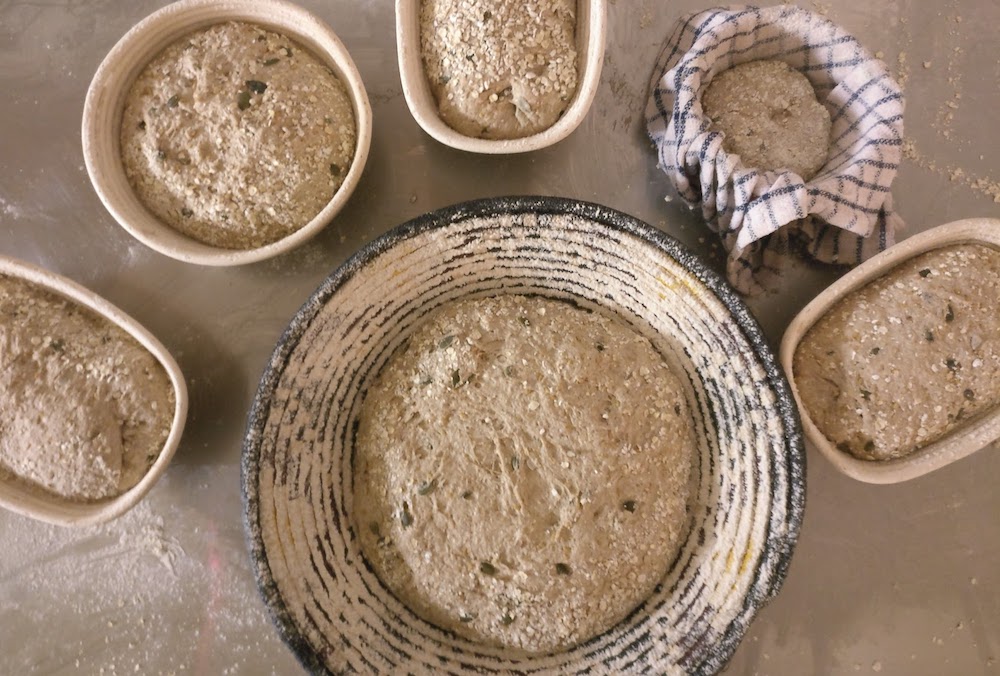
Sourdough proving. Photograph: Kawther Luay
A Guiding Metaphor
The transformative process of sourdough bread is a powerful example of the effects of good relationships, both with one another and with the natural world from which our raw ingredients originate. Because the process takes much longer than ordinary leavened bread, the making of sourdough can act as a guiding metaphor for giving relationships their due time, a taciturn act that inevitably yields something better on a multitude of levels. In a food system riddled with efficiency-driven, bottom-line margins, there lies a unique incentive for us to take back the practical practice of baking. As Andrew Whitley has said:
I would like to encourage you to think about being agents of change by passing on sourdough and all our understanding about our food, how we should do it better and more mindfully… And thereby, in your actions of mindful baking and passing on of good things, to change our food, our bread and even – I think it’s fair to say – our society, one loaf at a time. [2]
***
Two Nourishing Poems
from the Heritage Bakehouse Project
The Hazel Trees
by Hadewijch of Antwerp
In the beginning Love satisfies us.
When Love first spoke to me of love –
How I laughed at her in return!
But then she made me like the hazel trees,
Which blossom early in the season of darkness,
And bear fruit
Sunlight
by Seamus Heaney
To Mary Heaney
There was a sunlit absence.
The helmeted pump in the yard
heated its iron,
water honeyed
in the slung bucket
and the sun stood
like a griddle cooling
against the wall
of each long afternoon.
So, her hands scuffled
over the bakeboard,
the reddening stove
sent its plaque of heat
against her where she stood
in a floury apron
by the window.
Now she dusts the board
with a goose’s wing,
now sits, broad-lapped,
with whitened nails
and measling shins:
here is a space
again, the scone rising
to the tick of two clocks.
And here is love
like a tinsmith’s scoop
sunk past its gleam
in the meal-bin. [3]
More News & Views
Introducing… ‘Perfect Days’ and ‘Nowhere Special’
Jane Clark watches two films with a contemplative theme
Irreducible: Consciousness, Life, Computers and Human Nature
Richard Gault reviews a new book by one of the leading lights of the science of consciousness
An Irish Atlantic Rainforest
Peter Mabey reviews a new book by Eoghan Daltun which presents an inspiring example of individual action in the face of climate change
In Memory of Bill Viola (1951–2024)
Jane Carroll pays tribute to the acclaimed video artist, who died on July 12th 2024
Bringing More Land Back to Life
Luci Attala gives an update on the Kogi’s exciting regeneration project, Munekan Masha, in Colombia
Wild Service: Why Nature Needs You
Charlotte Maberly reviews a new book that argues that it is only by including human beings in nature that we can preserve it
FOLLOW AND LIKE US
——————————————
——————————————
——————————————
Sources (click to open)
[1] ANDREW WHITLEY, Bread Matters (Fourth Estate, 2009)
[2] ANDREW WHITLEY, Earth Talk Video, The Transformative Power of Sourdough Bread’ Schumacher College, 2015.
[3] SEAMUS HEANEY, from ‘Mossbawn: Two Poems in Dedication’ in North (Faber & Faber, 1975, reprinted 2001). Quoted on https://www.nobelprize.org/prizes/literature/1995/8422-poetry/
If you enjoyed reading this article
Please leave a comment below.
Please also consider making a donation to support the work of Beshara Magazine. The magazine relies entirely on voluntary support. Donations received through this website go towards editorial expenses, eg. image rights, travel expenses, and website maintenance and development costs.
READERS’ COMMENTS
4 Comments
Submit a Comment
FOLLOW AND LIKE US
This is a wonderful homage to our possibilities in this time. I too have been of the covid baking brigade for a while.Coming into contact with the milled grain in my hands, i was minded of walking on the earth barefoot which i often do when conditions are ‘right’. This too is elementarily nurturing and now i have a fantasy of walking in the wild one day and coming back to home made bread and jam.
The article reminds me of the “Notice to Cooks” written by Bulent Rauf for contemplation for all who produce nourishing food in the kitchens at the Chisholme Institute in the Scottish Borders. He writes “Therefore, cooking is not a mixture of ingredients but a harmonious composition of artistic value, nutrient and transcendent, giving the possibility of the best expression to the ingredients as well as to the composition in general”(B Rauf: Notice to Cooks, Addresses II, published by Beshara Publications 2001)
thank you very useful information
1